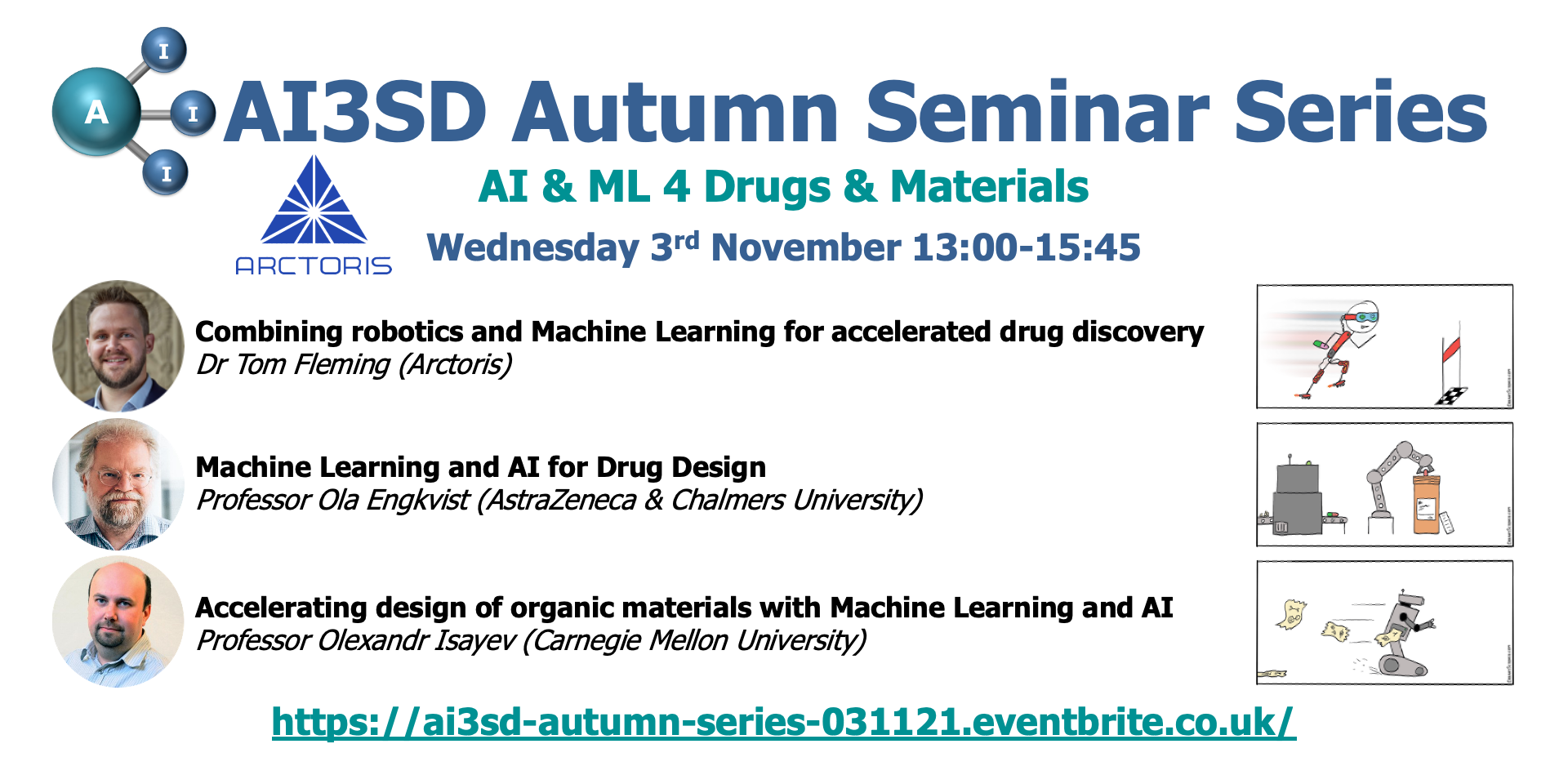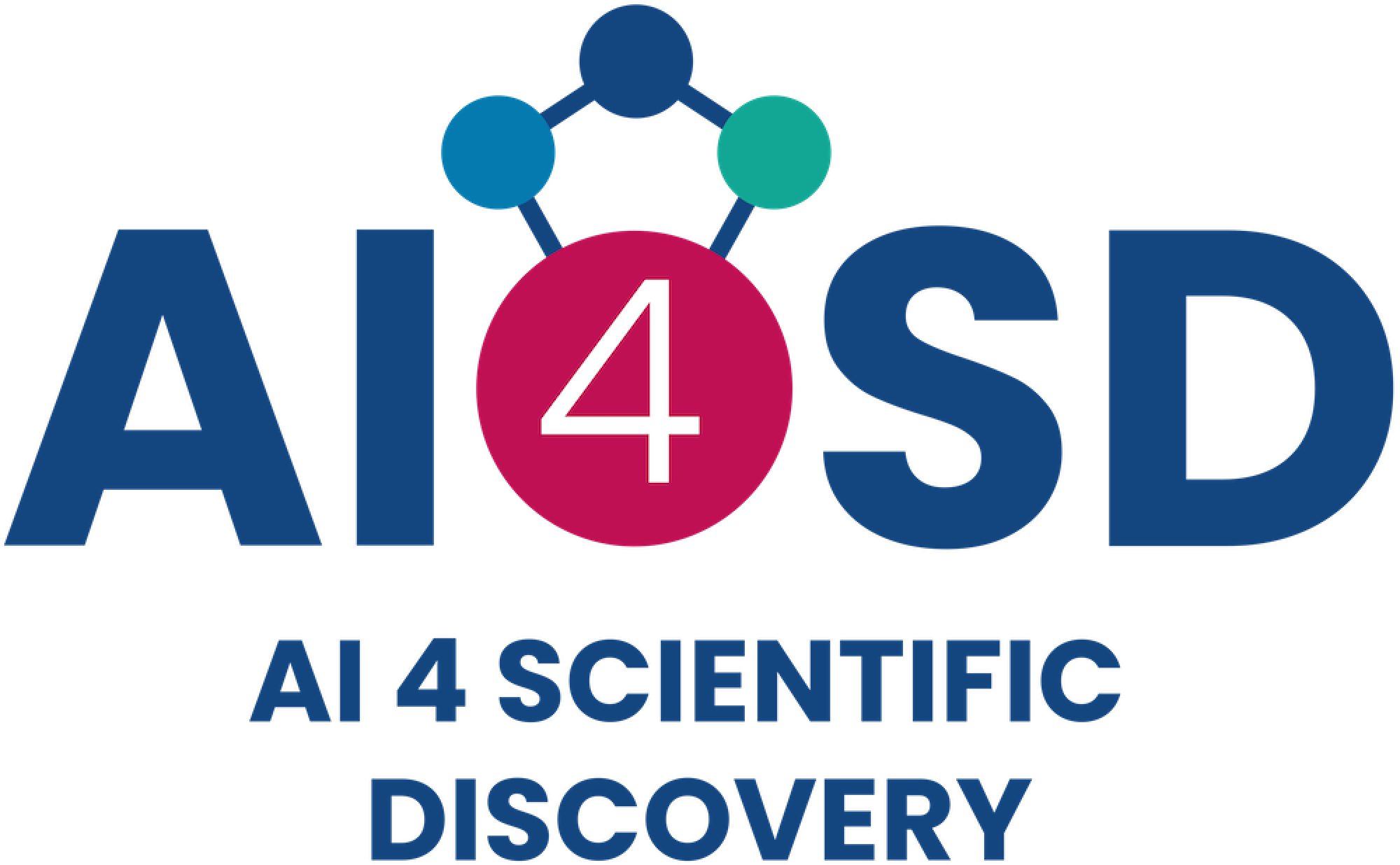
- This event has passed.
03/11/2021 – AI3SD Autumn Seminar IV: AI & ML 4 Drugs & Materials
3rd November 2021 @ 1:00 pm - 3:45 pm
Free
Eventbrite Link: https://ai3sd-autumn-series-031121.eventbrite.co.uk
Description:
This seminar forms part of the AI3SD Online Seminar Series that will run across the autumn (from October 2021 to December 2021). This seminar will be run via zoom, when you register on Eventbrite you will receive a zoom registration email alongside your standard Eventbrite registration email. Where speakers have given permission to be recorded, their talks will be made available on our AI3SD YouTube Channel. The theme for this seminar is AI & ML 4 Drugs & Materials.
Agenda
- 13:00-13:45: Combining robotics and Machine Learning for accelerated drug discovery – Dr Tom Fleming (Arctoris)
- 13:45-14:00: Coffee Break
- 14:00-14:45: Machine Learning and AI for Drug Design – Professor Ola Engkvist (AstraZeneca & Chalmers University)
- 14:45-15:00: Coffee Break
- 15:00-15:45: Accelerating design of organic materials with Machine Learning and AI – Professor Olexandr Isayev (Carnegie Mellon University)
Abstracts & Speaker Bios
- Combining robotics and Machine Learning for accelerated drug discovery – Dr Tom Fleming: Artificial intelligence has an increasing impact on drug discovery and development, offering opportunities to identify novel targets, hit, and lead-like compounds in accelerated timeframes. However, the success of any AI/ ML model depends on the quality of the input data, and the speed with which in silico predictions can be validated in vitro. The talk will cover laboratory automation and robotics and the benefits they offer in terms of quality and speed of data generation synergise with AI/ ML-powered drug discovery approaches. The talk will cover some of the general trends in the industry, and also highlight successfully implemented case studies that show the how the combination of robotics and AI/ ML lead to accelerated project timelines and superior research outputs.
Bio: Tom Fleming MChem is the COO of biotech platform company Arctoris, which he co-founded in Oxford in 2016. Tom’s background is in cancer research, having worked in academia as well as at leading CROs and pharmaceutical corporations. A chemical biologist by training, he has unique insights into preclinical drug discovery, including the critical steps from target identification and high-throughput screening up to lead optimization. Tom was a Fellow of the Royal Commission of 1851 at the University of Oxford, and is a SME Leader of the Royal Academy of Engineering. - Machine Learning and AI for Drug Design – Professor Ola Engkvist: Artificial Intelligence has become impactful during the last few years in chemistry and the life sciences, pushing the scientific boundaries forward as exemplified by the recent success of AlphaFold2. In this presentation I will provide an overview of how AI have impacted drug design in the last few years, where we are now and what progress we can reasonably expect in the coming years. The presentation will have a focus on deep learning based molecular de novo design, however, also aspects of synthesis prediction, molecular property predictions and chemistry automation will be covered.
Bio: Dr Ola Engkvist is head of Molecular AI in Discovery Sciences, AstraZeneca R&D. He did his PhD in computational chemistry at Lund University followed by a postdoc at Cambridge University. After working for two biotech companies he joined AstraZeneca in 2004. He currently lead the Molecular AI department, where the focus is to develop novel methods for ML/AI in drug design , productionalize the methods and apply the methods to AstraZeneca’s small molecules drug discovery portfolio. His main research interests are deep learning based molecular de novo design, synthetic route prediction and large scale molecular property predictions. He has published over 100 peer-reviewed scientific publications. He is adjunct professor in machine learning and AI for drug design at Chalmers University of Technology and a trustee of Cambridge Crystallographic Data Center.
- Accelerating design of organic materials with machine learning and AI – Professor Olexandr Isayev: Deep learning is revolutionizing many areas of science and technology, particularly in natural language processing, speech recognition, and computer vision. In this talk, we will provide an overview of the latest developments of machine learning and AI methods and application to the problem of drug discovery and development at Isayev’s Lab at CMU. We identify several areas where existing methods have the potential to accelerate materials research and disrupt more traditional approaches. First we will present a deep learning model that approximates the solution of Schrodinger equation. We introduce the AIMNet-NSE (Neural Spin Equilibration) architecture, which can predict molecular energies for an arbitrary combination of molecular charge and spin multiplicity. The AIMNet-NSE model allows to fully bypass QM calculations and derive the ionization potential, electron affinity, and conceptual Density Functional Theory quantities like electronegativity, hardness, and condensed Fukui functions. We show that these descriptors, along with learned atomic representations, could be used to model chemical reactivity through an example of regioselectivity in electrophilic aromatic substitution reactions. Second, we proposed a novel ML-guided materials discovery platform that combines synergistic innovations in automated flow synthesis and automated machine learning (AutoML) method development. A software-controlled, continuous polymer synthesis platform enables rapid iterative experimental–computational cycles that resulted in the synthesis of hundreds of unique copolymer compositions within a multi-variable compositional space. The non-intuitive design criteria identified by ML, which was accomplished by exploring less than 0.9% of overall compositional space, upended conventional wisdom in the design of 19F MRI agents and led to the identification of >10 copolymer compositions that outperformed state-of-the-art materials.
Bio: Olexandr Isayev is an Assistant Professor at the Department of Chemistry at Carnegie Mellon University. In 2008, Olexandr received his Ph.D. in computational chemistry. He was Postdoctoral Research Fellow at the Case Western Reserve University and a scientist at the government research lab. During 2016-2019 he was a faculty at UNC Eshelman School of Pharmacy, the University of North Carolina at Chapel Hill. Olexandr received the “Emerging Technology Award” from the American Chemical Society (ACS) and the GPU computing award from NVIDIA. The research in his lab focuses on connecting artificial intelligence (AI) with chemical sciences.
